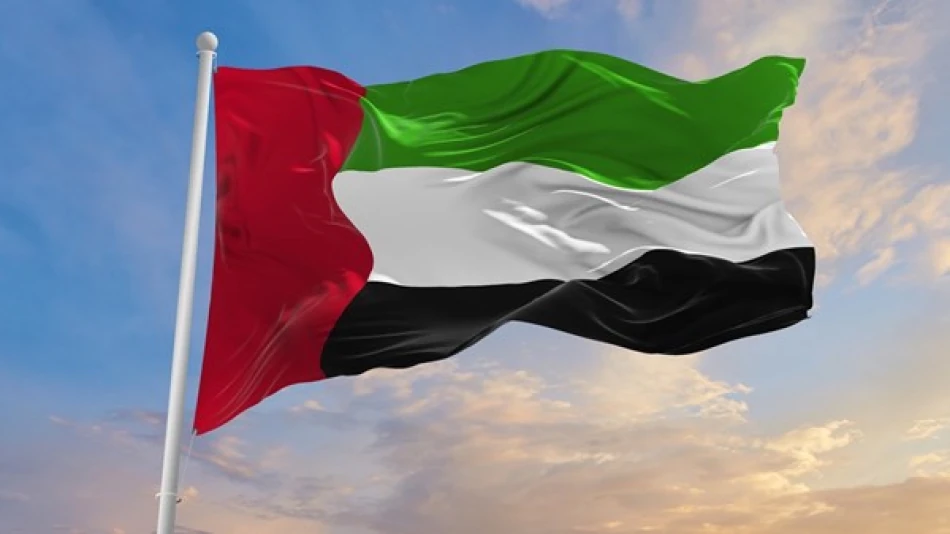
UAE Condemns Israeli Escalation in Gaza, Warns of Undermining Peace Efforts
UAE Condemns Israeli Settlement Expansion as UN Declares Famine in Gaza
The United Arab Emirates has issued a sharp condemnation of Israel's new settlement plans in the occupied West Bank while the United Nations officially declared famine conditions in Gaza, where 514,000 people now face "catastrophic" hunger. The UAE's stance highlights growing regional tensions as international bodies classify the Gaza crisis as a "man-made disaster" that could have been entirely prevented.
UAE Takes Diplomatic Stand Against Settlement Expansion
The UAE Ministry of Foreign Affairs released a statement strongly condemning Israel's latest settlement initiatives in the occupied West Bank, describing them as serious violations of international law and relevant UN resolutions. The ministry warned that continued military operations in Gaza represent a dangerous undermining of regional and international peace efforts aimed at establishing an independent Palestinian state.
The Emirates called for an immediate halt to both settlement activities and military operations, urging the international community to fulfill its responsibilities in stopping these violations and launching a serious political process toward comprehensive peace based on international legitimacy resolutions.
UAE's Humanitarian Leadership Amid International Failure
Dr. Anwar Gargash, the diplomatic advisor to the UAE President, emphasized his country's humanitarian commitment as the UN declared famine in Gaza. Writing on X platform, he noted that the UAE has contributed 42% of total international aid to alleviate the Gaza crisis, positioning the nation as a leading humanitarian actor while the international community faces what UN officials call a "moment of collective shame."
This substantial aid contribution demonstrates the UAE's strategic soft power approach, using humanitarian assistance to maintain regional influence while navigating complex diplomatic relationships. The Emirates' ability to provide such significant aid while maintaining diplomatic ties with Israel showcases the nuanced balance Gulf states must strike in modern Middle Eastern geopolitics.
UN Declares Historic Famine Outside Africa
The Integrated Food Security Phase Classification (IPC) issued its first-ever famine declaration outside Africa, confirming that approximately 514,000 people—nearly a quarter of Gaza's population—are experiencing famine conditions. This figure is projected to rise to 641,000 by the end of September, with the northern Gaza governorate already in full famine status.
Technical Famine Criteria Met
The classification meets all technical requirements for famine declaration: at least 20% of the population faces acute food shortages, one in three children suffers from acute malnutrition, and two people per 10,000 die daily from hunger, malnutrition, or related diseases. These metrics represent the most severe humanitarian classification possible.
The famine is expected to spread to Deir al-Balah in central Gaza and Khan Yunis in the south by next month, while conditions in northern areas may be even worse than currently documented due to data collection difficulties.
International Response and Israeli Rejection
UN Secretary-General António Guterres characterized the famine as a "man-made catastrophe, a moral stain, and a failure of humanity itself," calling for immediate ceasefire, hostage releases, and unobstructed humanitarian aid access. UN Emergency Relief Coordinator Tom Fletcher directly blamed Israel's "systematic obstruction" of food aid, stating the crisis was entirely preventable.
Israel rejected the report as inaccurate and biased, claiming it relied on flawed data and failed to account for recent food deliveries to the territory. This response reflects the broader information warfare surrounding the conflict, where competing narratives about humanitarian conditions serve strategic purposes for all parties involved.
Regional Implications and Market Perspectives
The UAE's diplomatic positioning reflects broader Gulf state strategies of maintaining relationships with both Israel and Palestinian territories while building humanitarian credentials. This approach allows the Emirates to preserve the Abraham Accords benefits—including trade partnerships and security cooperation—while addressing domestic and regional public opinion concerns about Palestinian suffering.
For international markets, the escalating humanitarian crisis increases pressure for intervention mechanisms that could affect regional stability and energy security. The UAE's prominent humanitarian role also reinforces its position as a reliable partner for Western nations seeking regional allies who can navigate complex Middle Eastern dynamics.
Historical Context and Precedent
This marks the first time the IPC has declared famine conditions outside Africa since its establishment, highlighting the unprecedented nature of Gaza's humanitarian collapse. Previous famines in Yemen, Somalia, and South Sudan occurred in contexts of state collapse or civil war, making Gaza's situation unique as it involves a densely populated territory under military blockade.
The UAE's 42% contribution to international Gaza aid represents a significant diplomatic investment, potentially positioning the Emirates as an indispensable mediator in future peace processes. This strategy mirrors successful Emirati approaches in other regional conflicts, where humanitarian leadership translated into political influence and economic opportunities.
Most Viewed News

 Layla Al Mansoori
Layla Al Mansoori






